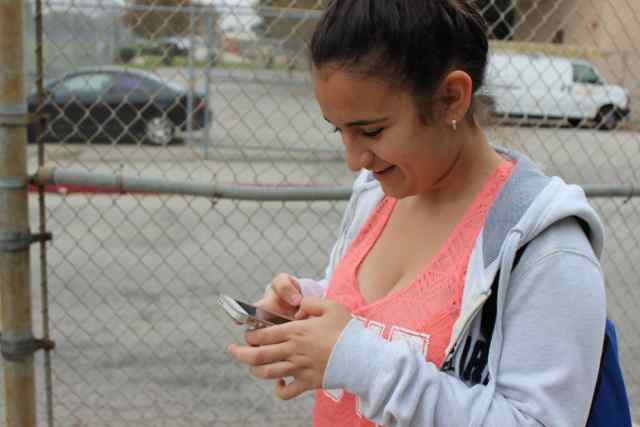Cellphone policy revised to the benefit, relief of students
August 28, 2015

Once the new school year began, students were free to use their cellphones during nutrition and lunch; a privilege that was previously revoked for misconduct.
Students were originally allowed to use their electronic devices during nutrition and lunch in the 2013-2014 school year. That privilege was removed in May 2014 when offensive Twitter accounts were created that targeted students and staff.
“We had an incident with one student who created Twitter pages that were very vulgar and offensive to many students and many teachers,” Principal Deb Smith said. “I did not feel that it was okay to allow the students to have access to their devices until we found out who was behind the creations of the new Twitter pages.”
This incident brought up many issues regarding responsible use of social media. This became a ‘school-wide’ incident because other students were following that account and they didn’t report it to anyone.
“If you’re following that account and not reporting it. Or if you’re following it and you’re not openly communicating to those that are doing it to stop, then you’re part of the problem. You’re not part of the solution,” Smith said.
During student orientation on Aug. 11 and 12, all students and parents were required to attend a school policies meeting. Part of the meeting was dedicated to addressing digital citizenship and the revised cellphone policy.

At the meeting, Smith announced the changes to the electronic device policy. She said that appropriate times to use these devices without any penalty would be before school, nutrition, lunch and after school. The other part of the policy is that headphones are not to be seen during school hours. This is a safety problem because students should be able to hear what’s happening around them.
Smith’s advice to parents was that they “own the device” and have complete control over what happens to it. Students and their parents were required to sign a form in order to be allowed to use their electronic devices once school began.
Last year, a representative from the District Attorney’s office came and spoke to students about digital citizenship. It was decided that students received enough education about this topic to bring back this privilege.
Although students were frustrated with not being able to openly use their devices during the previous school year, there were some positive outcomes. The more restrictive policy gave students the opportunity to interact with each other, instead of being glued to their devices.
“There’s no difference (between the policies),” senior Caroline Maroutian said. “It’s actually even better now because when we talk about something I can actually search on my phone for whatever I’m looking for.”
If electronic devices are misused again, then there will be consequences for that student based on the severity of their actions, Smith said.
“I hope they (the students) recognize that this is a privilege and that it’s their responsibility to act appropriately,” Smith said. “It’s their responsibility to use social media in a way that is supportive and not used in a way to hurt other people.”







